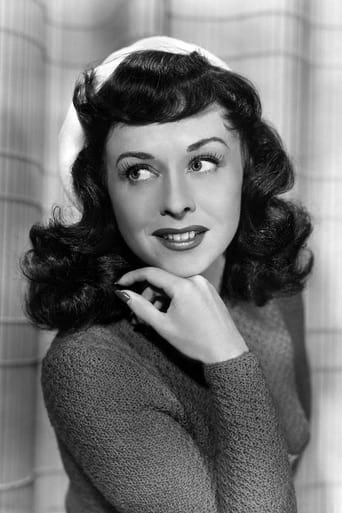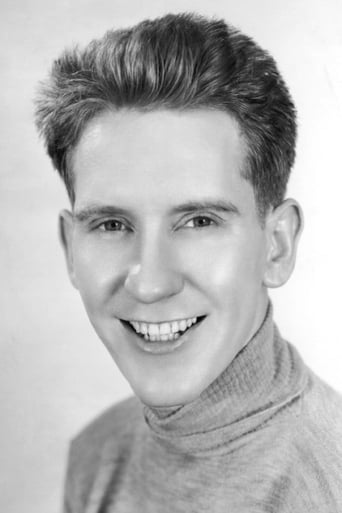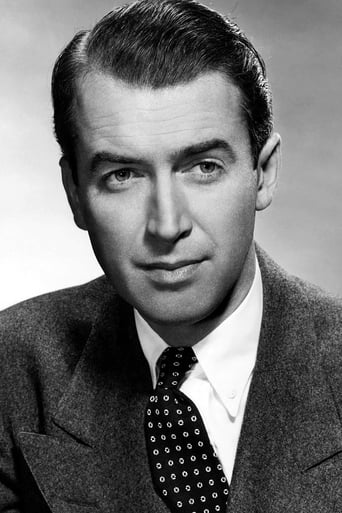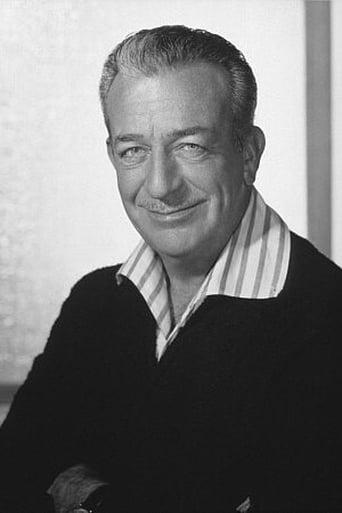MamaGravity
good back-story, and good acting
RipDelight
This is a tender, generous movie that likes its characters and presents them as real people, full of flaws and strengths.
Maidexpl
Entertaining from beginning to end, it maintains the spirit of the franchise while establishing it's own seal with a fun cast
Brendon Jones
It’s fine. It's literally the definition of a fine movie. You’ve seen it before, you know every beat and outcome before the characters even do. Only question is how much escapism you’re looking for.
DKosty123
This movie is done in sequences and cobbled together later which makes it different than most films. It has 4 Directors listed including some top ones and an A-List cast that includes some folks from the silent era as well as some top stars.This has a scene with William Demarest and Fred McMurray which reminded me of all the scenes they do together in MY Three Sons much later. Jimmy Stewart and Henry Fonda in the same film is a rare thing, we have that here. Harry James from the big band era, and a young Burgess Meredith as a reporter.This movie is rich with character actors and the script is written by some top screen writers. So is it perfect? It is an experiment back in this era and because of the cast it is worth a view. Each sequence varies in quality and you will like some of them better than others. At least that is what I did.
vincentlynch-moonoi
To rightly call a movie "awful" is fine with me. But to totally misstate part of the story is highly inappropriate. In his review here, poster aberlour36 refers to "Fonda playing drunk and Stewart with an apple stuck in his mouth...". Well, Fonda wasn't playing drunk, he was sea sick. Stewart didn't have an apple stuck in his mouth, it was a lemon, and part of the plot.Now, as to the movie: How do you take a movie with Burgess Meredith, Paulette Goddard, James Stewart, Henry Fonda, Dorothy Lamour, Victor Moore (you'll know him when you see him), Fred MacMurray, William Demarest, Harry James, Hugh Herbert, and even Carl 'Alfalfa' Switzer and turn it into a stinker? Why watch this film? Well, not to see Henry Fonda and Jimmy Stewart act, but perhaps to see them doing something akin to slapstick (note I say "akin", because it's not quite slapstick). Not to mention seeing Fonda play someone with a speech impediment. No, this is not Academy Award material! The film is actually three separate stories strung together by a hopeful newspaper (Burgess Meredith) reporter trying to find a good story line.And then there is the question of the missing Charles Laughton segment. Well, though the magic of You Tube, you can see this footage. Although interesting, Laughton's performance as a failure doesn't ring true. He doesn't seem at all upset about it, but leaves his church anyway, right in the middle of a tremendous thunderstorm (which also doesn't make much sense). Laughton converts a dying man by reading -- very poorly I might add -- from the scriptures. You would think a segment starring Charles Laughton would be better than a segment (which replaced it) starring Dorothy Lamour. But at least in this case, you would be wrong. The Lamour segment is more entertaining, and actually fits the overall story line better.The Fred MacMurray segment is downright foolish.I can only guess that the underlying problem here is that one of the stars was producer -- Burgess Meredith. Proving once again that most actors ought to stay in front of the cameras.Really, watch this one just to see how bad a movie can be.
kerrison-philips
As the "Trivia" section states, Charles Laughton was in the original version of this film under its title "A Miracle Can Happen". His was a sequence of 20 minutes or so which came between the Fonda/Stewart story and the one with Fred MacMurray which ended the movie. During the war, Laughton had taken to reading from great works of literature, including the Bible, to invalided US servicemen. He continued to give reading tours after the war and his appearance in "A Miracle Can Happen" was clearly an attempt to put one of his Bible readings on film. He played a washed-out minister who bores his congregation to tears, but one rainy night a small boy asks Laughton to visit his sick father. In an attempt to boost the dying man's spirits, Laughton rises to the occasion with an over-the-top delivery of the Saul and David story that completely revitalises the father. It then turned out that the little boy who invited Laughton in, but who has now disappeared from the scene, had died some years earlier. So, as Laughton told Meredith at the end of the sequence, "a miracle happened." For whatever reason, the Laughton sequence was deleted from the US release but not before prints has been sent abroad to other countries. Consequently, it has long been known that, for example, a Spanish version of "A Miracle Can Happen" - with Laughton and all the others dubbed into that language - has been seen on TV in Spain and is now available there on DVD, complete with the original English dialogue.With Laughton having been deleted, the Dorothy Lamour sequence was added in as a replacement, and the film was duly re-titled "On Our Merry Way." I agree with the sentiments expressed by others who find this film an embarrassment all round. Fonda and Stewart are no masters of farcical comedy and neither are any of the other principals. As for Laughton in the original film, his hamming up of the Bible story has to be seen to be believed. Nevertheless, both versions are of some interest because of the talents involved but I agree with anyone who says that once you've seen either version you're not likely to want to see them again!
nicholas-salerno
Before I committed to buying the DVD of "On Our Merry Way," I got it from Netflix and happy I am that I did so, for it's not likely I'd ever want to watch it again. "On Our Merry Way" is an anthology film in the manner of "O. Henry's Full House," but while the latter has a no-nonsense framework with John Steinbeck introducing the episodes, "On Our Merry Way" uses the gimmick of Burgess Meredith talking directly to the camera every so often. It doesn't work; it seems more like a vanity project for Meredith and his then wife Paulette Goddard.Nor do the stories work. They are shaggy dog stories that bore you long before they reach a conclusion. The Henry Fonda-James Stewart and Fred MacMurray-William Demarest episodes are simply not funny. "On Our Merry Way" is full of overacting (especially from Carl "Alfalfa" Switzer) and shtick (from Victor Moore and Hugh Herbert). Dorothy Lamour, on the other hand,comes off extremely well both as an addle-pated secretary and then with a song that satirizes her own career; for Lamour it's a triumph over inferior material.John O'Hara is credited for one of the stories, O. Henry is not, even though his "The Ransom of Red Chief" serves as the basis for the MacMurray-Demarest episode; for comparison, watch the Fred Allen-Oscar Levant take on the same story in "O. Henry's Full House." It's only minimally better but it moves faster.It's inconceivable to me that so many great directors, credited or un-, would produce such a mess.One can't help be grateful to Kino for clearing the copyright problems which had long kept the film in limbo; after all, we do want to preserve the work of our great stars, no matter how bad. But once our curiosity is satisfied, "On Our Merry Way" becomes a shelve-it-and-forget-it film.For a much better pairing of Meredith and Goddard, I'd recommend Jean Renoir's English-language version of "The Diary of a Chambermaid."




